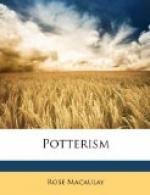So did his wife. She was pink-faced and not ill-looking, with the cold blue eyes and rather set mouth possessed (inexplicably) by many writers of fiction. If I have conveyed the impression that Leila Yorke was in the lowest division of this class, I have done her less than justice; quite a number of novelists were worse. This was not much satisfaction to her children. Jane said, ’If you do that sort of thing at all, you might as well make a job of it, and sell a million copies. I’d rather be Mrs. Barclay or Ethel Dell or Charles Garvice or Gene Stratton Porter or Ruby Ayres than mother. Mother’s merely commonplace; she’s not even a by-word—quite. I admire dad more. Dad anyhow gets there. His stuff sells.’
Mrs. Potter’s novels, as a matter of fact, sold quite creditably. They were pleasant to many, readable by more, and quite unmarred by any spark of cleverness, flash of wit, or morbid taint of philosophy. Gently and unsurprisingly she wrote of life and love as she believed these two things to be, and found a home in the hearts of many fellow-believers. She bored no one who read her, because she could be relied on to give them what they hoped to find—and of how few of us, alas, can this be said! And—she used to say it was because she was a mother—her books were safe for the youngest jeune fille, and in these days (even in those days it was so) of loose morality and frank realism, how important this is.
‘I hope I am as modern as any one,’ Mrs. Potter would say, ’but I see no call to be indecent.’
So many writers do see, or rather hear, this call, and obey it faithfully, that many a parent was grateful to Leila Yorke. (It is only fair to record here that in the year 1918 she heard it herself, and became a psychoanalyst. But the time for this was not yet.)
On her right sat her eldest son, Frank, who was a curate in Pimlico. In Frank’s face, which was sharp and thin, like his father’s, were the marks of some conflict which his father’s did not know. You somehow felt that each of the other Potters had one aim, and that Frank had, or, anyhow, felt that he ought to have, another besides, however feebly he aimed at it.
Next him sat his young wife, who had, again, only the one. She was pretty and jolly and brunette, and twisted Frank round her fingers.
Beyond her sat Clare, the eldest daughter, and the daughter at home. She read her mother’s novels, and her father’s papers, and saw no harm in either. She thought the twins perverse and conceited, which came from being clever at school and college. Clare had never been clever at anything but domestic jobs and needlework. She was a nice, pretty girl, and expected to marry. She snubbed Jane, and Jane, in her irritating and nonchalant way, was rude to her.
On the other side of the table sat the twins, stocky and square-built, and looking very young, with broad jaws and foreheads and wide-set gray eyes. Jane was, to look at, something like an attractive little plump white pig. It is not necessary, at the moment, to say more about her appearance than this, except that, when the time came to bob the hair, she bobbed it.




